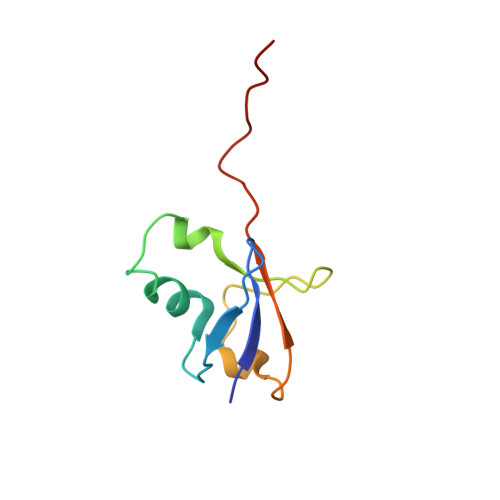Elimination of the C-cap in ubiquitin-structure, dynamics and thermodynamic consequences.
Ermolenko, D.N., Dangi, B., Gvritishvili, A., Gronenborn, A.M., Makhatadze, G.I.(2007) Biophys Chem 126: 25-35
- PubMed: 16713063
- DOI: https://doi.org/10.1016/j.bpc.2006.03.017
- Primary Citation of Related Structures:
1ZW7 - PubMed Abstract:
Single amino acid substitutions rarely produce substantial changes in protein structure. Here we show that substitution of the C-cap residue in the alpha-helix of ubiquitin with proline (34P variant) leads to dramatic structural changes. The resulting conformational perturbation extends over the last two turns of the alpha-helix and leads to enhanced flexibility for residues 27-37. Thermodynamic analysis of this ubiquitin variant using differential scanning calorimetry reveals that the thermal unfolding transition remains highly cooperative, exhibiting two-state behavior. Similarities with the wild type in the thermodynamic parameters (heat capacity change upon unfolding and m-value) of unfolding monitored by DSC and chemical denaturation suggests that the 34P variant has comparable buried surface area. The hydrophobic core of 34P variant is not packed as well as that of the wild type protein as manifested by a lower enthalpy of unfolding. The increased mobility of the polypeptide chain of this ubiquitin variant allows the transient opening of the hydrophobic core as evidenced by ANS binding. Taken together, these results suggest exceptional robustness of cooperativity in protein structures.
- Department of Biochemistry and Molecular Biology, Penn State University College of Medicine, Hershey, PA 17033, USA.
Organizational Affiliation:
















